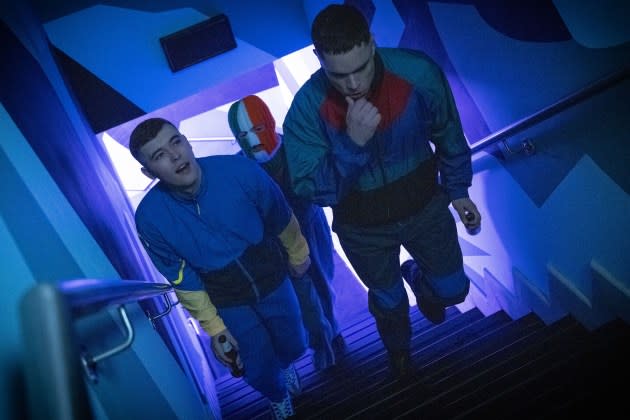‘Kneecap’ Review: Belfast’s Hip-Hop Upstarts Give The Establishment The Finger In Ireland’s Raucous Oscar Submission

Sex, drugs and some kid blasting into a microphone: It’s still the most shocking, most fun combination of anything in the world, still the stuff that blasts each generation out of childhood into the thrill of youth. Kneecap, both the Irish-language rap band and the film in which the three “low-life scum” band members play themselves, have managed to delight vast crowds — including the ones that gave the film the NEXT Audience Award at Sundance — while making culture-war enemies all the way to the top echelons of the British government. Which is entirely as it should be.
First, a word about those cultural enemies. Kneecap rap in Gaelic, once banned from classrooms in Northern Ireland — the six counties of Ireland that remain under British governance — and only recently (and very controversially) given the status of an official language of the land. Naoise Ó Caireallain, one of the two boyhood friends who start Kneecap, is the child of a Provo called Arlo (Michael Fassbender). “Every word of Irish spoken is a bullet for Irish freedom,” Arlo used to tell Naoise and his friend Liam Óg Ó hAnnaidh as boys, waving a gun in the air to emphasize the point. Arlo now has been on the run, generally presumed dead, for 10 years. He’s a relic of old hatreds.
More from Deadline
Oscars: Ireland Submits ‘Kneecap’ For 2025 Best International Feature Film Category
Oscars: Here Are This Year’s Submissions For Best International Feature Film
Liam and Naoise, by contrast, call themselves ceasefire babies; the war is over, but they’re living with the fallout. That includes Arlo’s old Provo mates, who now are given to sentimental memorial services for the fallen and beating the heads of anyone they think isn’t keeping the proper faith, which includes the Kneecap boys. You see why. Their lyrics may dump on British authorities, the police and Protestant Loyalist parties, but they welcome the Proddies to shows; Liam is even having a hot affair with a Protestant girl who likes to pretend they’re in a cell where she dishes out sexy torture. Mostly, they just want to snort a lot of white powder.
Soon after we are introduced to them, Liam is arrested at a club for dealing drugs and refuses to answer the police questions in English, claiming his right to speak Irish; they have to find a translator in the middle of the night. Which is how he meets J.J. Ó O’Dochartaigh, who teaches music in high school. Somehow, mild-mannered J.J. ends up mixing tracks for the boys, then appearing onstage with them disguised in a very on-brand balaclava. Their show is riotous, wild and wonderful. They all take more drugs, mistaking ketamine for cocaine so the world goes completely loopy. They rename themselves; Liam is now Mo Chara, Naoise is Móglai Bap and J.J. is DJ Provaí. They’re on fire.
Rich Peppiatt, who previously has made videos for the band, captures the frenzied pace of all this by editing shots that often last a fraction of a second, cutting between microphone, hand, face, somebody else’s delirious expression, a white line. English translations of the songs’ lyrics are scrawled across the screen; you might not catch them as they pop up, but it hardly matters if you don’t. There are flashes of tableaux of clay figures and snatches of animation; when the lads are heading down the K-hole, the image dissolves into fast-moving jello. Cinematographer Ryan Kernaghan throws everything into the mix; moreover, he seems to have shot the whole film on rollerblades. You wonder if you can keep up.
It all fits. The band is a lot; this is a lot. Some of the incidents are true, according to interviews; some happened to other people; some are just invented. For one thing, the three band members are quite remarkably good at acting themselves. Brazen, too: What will their mammies think? “We don’t discriminate who we piss off,” the boys were reported saying in Sundance (where they arrived in a graffitied police Land Rover), which surely must be true. Accordingly, some critics have compared the film sniffily to a Guy Ritchie gangland caper. But it doesn’t — they don’t — have that kind of smug self-regard. Bad boys they may be, but they brim with eager innocence. And, when it comes down to it, they are true believers.
Politically, they are socialists who say they stand with the working class on both sides of the sectarian fence. They also are surprisingly well organized. Recently, they went in hard when government minister Kemi Badenoch, who now is the leader of the Conservative Party, blocked a grant they had been allotted by an independent body charged with supporting music exports. The band sued for discrimination, won the case and donated the money — the same amount they would have had under the grant — to Protestant and Catholic youth support groups. The point, for them, was their right to free speech, even if it is speech that only 6,000 people in the north of Ireland understand. Except that we do understand it in this docudrama: It’s a big fat-fingered eff-you. Amazing, really, how much fun that can be.
Title: Kneecap
Distributor: Sony Pictures Classics
Director-screenwriter: Rich Peppiatt
Cast: Naoise Ó Cairealláin, Liam Óg Ó Hannaidh, J.J. Ó Dochartaigh, Josie Walker, Fionnuala Flaherty
Rating: R
Running time: 1 hr 45 mins
Best of Deadline
Telluride Film Festival 2024: All Of Deadline’s Movie Reviews
Broadway Spring 2024: Sufjan Stevens ‘Illinoise’ & All Of Deadline’s Reviews
Sign up for Deadline's Newsletter. For the latest news, follow us on Facebook, Twitter, and Instagram.

 Yahoo Lifestyle
Yahoo Lifestyle 